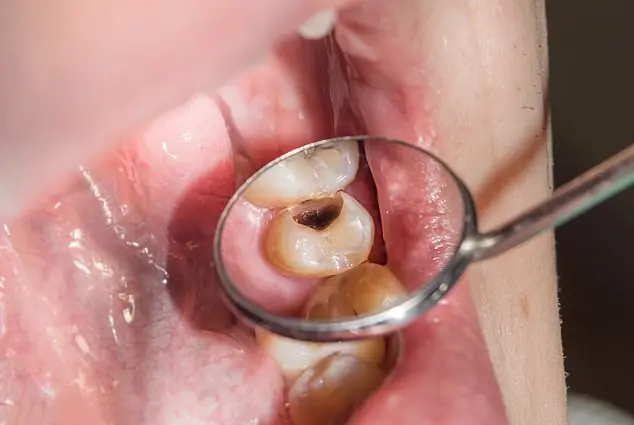
Two cities that stopped adding fluoride to water have seen shocking results on teeth years later
Fluoride in drinking water has been a topic of debate for decades, but recent developments in two cities-Juneau, Alaska, and Calgary, Canada-have raised new concerns about the impact of removing fluoride from municipal water supplies. According to studies, children living in these cities who have not been exposed to fluoride in their drinking water have seen alarming increases in severe tooth decay. These findings have sparked fears among health experts in the United States, where there are growing calls to reconsider the widespread practice of fluoridating public water supplies.
In this article, we will explore the consequences of removing fluoride from drinking water, what happened in Juneau and Calgary, and why experts are concerned that similar outcomes could be seen across the U.S. if the anti-fluoride movement continues to gain traction.
Fluoride's Role in Public Health
Fluoride has been added to public water systems in the United States since the 1940s as a public health measure to reduce tooth decay, particularly among children. The addition of fluoride to tap water is considered one of the greatest medical achievements of the 20th century, with significant reductions in dental cavities in populations that consume fluoridated water. The U.S. Centers for Disease Control and Prevention (CDC) has called water fluoridation one of the "10 great public health achievements" of the 20th century.
However, as the practice became widespread, concerns about potential health risks associated with fluoride started to surface. Critics have pointed to research that links fluoride exposure to a range of health issues, including cancer, developmental disorders, and damage to bones and teeth. This skepticism has led to increasing calls for the removal of fluoride from drinking water, particularly in certain regions of the U.S.
The Decision to Remove Fluoride
Juneau, Alaska, and Calgary, Canada, both decided to stop adding fluoride to their municipal water supplies due to concerns about its potential health risks. In Juneau, the decision was made in 2007, while Calgary followed suit in 2011. Local officials in both cities cited worries about the possible adverse effects of fluoride on health, despite its established benefits in preventing tooth decay.
In both cities, the removal of fluoride from drinking water was met with mixed reactions. While some hailed the decision as a victory for health freedom, others voiced concern about the potential negative impact on dental health, especially for children. These concerns proved to be valid, as studies have shown a significant increase in the incidence of tooth decay in children after fluoride was removed from the water supply.
Children living in two cities that removed fluoride from drinking water are suffering from shocking levels of severe tooth decay, studies have found
The Impact of Removing Fluoride on Children's Dental Health
In Juneau, a study conducted by researchers led by Jennifer Meyer in 2018 analyzed Medicaid dental claims records before and after the city's fluoride ban. The study found that the average number of dental treatments per child under age six nearly doubled after fluoride was removed. In 2003, the average number of procedures to treat tooth decay in children was 1.5 treatments per child. By 2012, this number had risen to 2.5 treatments per child, indicating a sharp increase in tooth decay.
The cost of these treatments also rose significantly, with an average increase of more than $300 per child during this period. Meyer pointed out that the removal of fluoride ultimately burdened taxpayers with higher healthcare costs. "When politicians decide to withhold a safe and effective public health intervention like fluoridation, they are imposing a hidden health care tax on everyone in their state or community," Meyer told Science News.
Similarly, in Calgary, a study conducted by Lindsay McLaren, a quantitative social scientist at the University of Calgary, found that the rate of tooth decay among seven-to-eight-year-olds was 10 percent higher than in children from Edmonton, a neighboring city with fluoridated water. McLaren surveyed over 2,600 second-graders and found that 65 percent of them had tooth decay, compared to 55 percent of children in Edmonton. While a 10 percent difference may seem small, McLaren explained that it was statistically significant, with the potential for a significant increase in dental issues in larger populations. "Compared to Edmonton kids, Calgary kids were now considerably worse as far as dental health goes," she said.
The Broader Health Implications of Poor Dental Hygiene
The rise in tooth decay is not just a cosmetic issue-it has broader health implications. Poor dental hygiene, particularly in children, can lead to a host of other health problems. Untreated tooth decay can cause pain and discomfort, but it can also lead to infections in other parts of the body, including the heart, kidneys, and respiratory system.
Dental infections can trigger serious conditions such as endocarditis, an infection of the heart lining, and respiratory infections that may lead to pneumonia. Furthermore, there is growing evidence linking poor oral health to other chronic conditions, including diabetes, cardiovascular disease, and even some types of cancer. The removal of fluoride from public water supplies could contribute to an increase in these health issues, especially if dental problems go untreated.
In Juneau, the average number of procedures to treat tooth decay in children under age six nearly doubled after fluoride was removed, according to one study (STOCK)
The Anti-Fluoride Movement and Its Growing Influence
The growing skepticism about the safety of fluoride has led to increasing calls to remove it from drinking water, not just in Juneau and Calgary, but across the U.S. In March 2023, Utah became the first state in the U.S. to pass legislation banning the addition of fluoride to public water supplies. The decision was largely driven by the anti-fluoride movement, which has gained momentum in recent years, fueled by concerns over the potential health risks of fluoride exposure.
One of the most vocal advocates against fluoride is Robert F. Kennedy Jr., who has repeatedly claimed that fluoride is an "industrial waste" linked to a variety of health problems, including arthritis, bone fractures, bone cancer, IQ loss, neurodevelopmental disorders, and thyroid disease. While these claims have been widely criticized by scientists and health experts, Kennedy’s influence has spurred further anti-fluoride campaigns across the U.S.
However, despite the growing anti-fluoride sentiment, health experts warn that removing fluoride from drinking water could have serious consequences for public health. Dr. Warren Loeppky, a pediatric dentist in Calgary, has witnessed firsthand the increase in tooth decay since fluoride was removed from the city’s water supply. “It’s always sad seeing a young child in pain,” he said. “Dental decay is very preventable. It breaks your heart to see these young kids that aren’t able to eat.”
Dr. Loeppky’s sentiments are echoed by other dental professionals who caution against removing fluoride from public water supplies. They argue that fluoride is a safe and effective way to prevent tooth decay and improve oral health, particularly for children from low-income families who may not have access to regular dental care.
The Return of Fluoride in Calgary
In response to the increasing incidence of tooth decay, Calgary residents voted in 2021 to reintroduce fluoride to the city’s water supply. The decision was met with mixed reactions, but many health experts and dentists welcomed the move, believing it would help reverse the trend of worsening dental health among children. The re-fluoridation process is scheduled to begin in the second quarter of 2025, after city officials complete necessary inspections and ensure that the water treatment systems are functioning properly.
While Calgary has taken steps to reinstate fluoride, Juneau remains without it, and there are currently no plans to reintroduce fluoride into the city’s drinking water. The ongoing debate over fluoride in drinking water continues to divide communities, with both sides presenting compelling arguments about the potential risks and benefits of this public health intervention.
Conclusion: The Need for Balance
The experiences of Juneau and Calgary serve as a cautionary tale about the potential consequences of removing fluoride from municipal water supplies. While concerns about the potential health risks of fluoride are valid, the evidence supporting its safety and effectiveness in preventing tooth decay is overwhelming. Removing fluoride from drinking water has led to a significant increase in tooth decay in both cities, resulting in higher treatment costs and poorer overall dental health.
As the debate over fluoride continues, it is important to strike a balance between addressing public concerns and maintaining effective public health measures. The reintroduction of fluoride in Calgary is a positive step toward improving dental health, but it remains to be seen whether other cities will follow suit. In the U.S., where the anti-fluoride movement is gaining traction, it is crucial to consider the long-term health consequences of removing fluoride from drinking water, particularly for children and vulnerable populations.
Ultimately, ensuring that all individuals have access to safe, effective, and affordable dental care should be the priority. Fluoridation, when done correctly and monitored appropriately, remains one of the most effective public health interventions for preventing tooth decay and promoting oral health. As we move forward, it is essential to continue researching and addressing the concerns surrounding fluoride while ensuring that public health is not compromised.
News in the same category


36-Year-Old Teacher Passed Away From Diabetes Doctors Say Was Triggered By Everyday Foods
Diabetes is a dangerous condition with numerous complications, and diet is a key factor.

Experts issue urgent warning about terrifying hidden symptom from taking Mounjaro and Ozempic
Experts have issued an urgent warning about a symptom that can come to light from taking drugs such as Mounjaro and Ozempic.

The Benefits of Epsom Salt Foot Soak: A Natural Remedy for Foot Pain and Health
Discover the health benefits of Epsom salt foot soaks, including pain relief, exfoliation, fungal infection treatment, and more. Learn how to safely use Epsom salt for foot health.

What Causes Blue Veins? Understanding the Reasons and When to Seek Help
Blue or green veins are common, but when should you worry? Learn the possible causes of visible veins, from genetics to lifestyle factors, and when it may indicate a medical condition.

7 Early Warning Signs of Diabetes You Shouldn’t Ignore: Act Now for Better Health
Learn about 7 early warning signs of diabetes that could be easily overlooked. Early detection can help manage diabetes, prevent complications, and improve quality of life. Read on for expert insights.

Genetic Link Between Endometriosis and Autoimmune Diseases Revealed in New Study
A new study has identified a shared genetic link between endometriosis and autoimmune conditions. Women with endometriosis are at a higher risk for diseases like rheumatoid arthritis, multiple sclerosis, and psoriasis.

People Warned to See a Doctor After Sharing Photo of Concerning Dark Line on Finger
A Reddit user received warnings to see a doctor immediately after posting an image of a dark line on their finger. Learn about melanonychia and why nail discoloration can be a serious health concern.

Breakthrough in Parkinson’s Treatment: Japanese Scientists Successfully Implant Lab-Grown Brain Cells
Japanese researchers have made a groundbreaking discovery in Parkinson’s treatment using lab-grown brain cells. Early results from the clinical trial show promising improvements in movement and dopamine production.

4 Simple Steps to Cool Your Home Faster and Save on Electricity Before Turning on the Air Conditioner

3-Blade vs. 5-Blade Fans: Which Cools Better? The Truth Behind Common Misconceptions

The Alarming Rise of Bowel C@ncer in Young Adults: Is Your Diet to Blame

United Airlines Passenger Punches Gate Agent, Kn0cking Them Out

Should You Close or Leave the Toilet Lid Open After Use? 90% of People Get It Wrong — Here's Why Your Bathroom Always Smells

4 Everyday Foods That Fuel C@ncer Cells

Fatty Liver Disease: A Silent Pathway to Liver C@ncer

The Hidden Purpose of the Pocket in Women's Underwear: More Than Just a Design Feature
In actuality, the "pocket" in women's underwear is actually a gusset, which serves a number very valid purposes.

This quick 'cup of tea' test could be a simple way to spot early signs of dementia in a loved one

A doctor has revealed a simple thumb test that can uncover a "ticking time b0mb" heart condition

Avocados are incredibly healthy, if using them incorrectly in these 3 common ways could actually have adverse effects
News Post

The Woman Who Walked Away: A Journey of Self-Discovery and Empowerment
A powerful tale of self-realization as Alina breaks free from a toxic relationship, finding strength and confidence after a painful breakup. Discover how she chooses her own path towards happiness and independence.

Silent Signals: Recognizing the Subtle Symptoms of Pancreatic C@ncer

The Earring in the Passenger Seat: A Suspicious Find Leads to a Truthful Confrontation
A woman finds a sh0cking truth after discovering a mysterious child’s drawing in her fiancé’s car. Suspicion, betrayal, and secrets unravel as she confronts him, ultimately deciding the fate of their relationship.

Am I Wrong for Not Laughing at My Fiancé's "Jokes" About Calling Off Our Wedding?
A bride-to-be is questioning her relationship after her fiancé repeatedly jokes about calling off their wedding. What happens when humor crosses the line into hurtful behavior?

36-Year-Old Teacher Passed Away From Diabetes Doctors Say Was Triggered By Everyday Foods
Diabetes is a dangerous condition with numerous complications, and diet is a key factor.

Experts issue urgent warning about terrifying hidden symptom from taking Mounjaro and Ozempic
Experts have issued an urgent warning about a symptom that can come to light from taking drugs such as Mounjaro and Ozempic.

The Benefits of Epsom Salt Foot Soak: A Natural Remedy for Foot Pain and Health
Discover the health benefits of Epsom salt foot soaks, including pain relief, exfoliation, fungal infection treatment, and more. Learn how to safely use Epsom salt for foot health.

What Causes Blue Veins? Understanding the Reasons and When to Seek Help
Blue or green veins are common, but when should you worry? Learn the possible causes of visible veins, from genetics to lifestyle factors, and when it may indicate a medical condition.

DIY Rice Cream for Radiant, Youthful Skin: The Japanese Secret to Erasing Wrinkles & Fine Line
With its powerful combination of rice, almond oil, and vitamin-rich ingredients, this rice cream provides nourishment, hydration, and antioxidant protection to your skin.

7 Early Warning Signs of Diabetes You Shouldn’t Ignore: Act Now for Better Health
Learn about 7 early warning signs of diabetes that could be easily overlooked. Early detection can help manage diabetes, prevent complications, and improve quality of life. Read on for expert insights.

5 Homemade Skin Toners for Smooth, Glowing Skin: Natural Remedies for Every Skin Type
By incorporating these toners into your daily routine, you can expect healthier, brighter, and more balanced skin without the use of harsh chemicals.

Genetic Link Between Endometriosis and Autoimmune Diseases Revealed in New Study
A new study has identified a shared genetic link between endometriosis and autoimmune conditions. Women with endometriosis are at a higher risk for diseases like rheumatoid arthritis, multiple sclerosis, and psoriasis.

Roasted Onion Peel and Garlic Peel Remedies for Grey Hair: Natural Solutions for Dark, Vibrant Hair
. Roasted onion peel and garlic peel offer effective, safe, and natural alternatives that can help you combat grey hair and restore youthful vitality.

People Warned to See a Doctor After Sharing Photo of Concerning Dark Line on Finger
A Reddit user received warnings to see a doctor immediately after posting an image of a dark line on their finger. Learn about melanonychia and why nail discoloration can be a serious health concern.

Breakthrough in Parkinson’s Treatment: Japanese Scientists Successfully Implant Lab-Grown Brain Cells
Japanese researchers have made a groundbreaking discovery in Parkinson’s treatment using lab-grown brain cells. Early results from the clinical trial show promising improvements in movement and dopamine production.

4 Simple Steps to Cool Your Home Faster and Save on Electricity Before Turning on the Air Conditioner

Effective Cumin Seed Detox Tonic for Belly Fat Reduction: Your Ultimate Guide to a Flatter Midsection
The cumin seed detox tonic is a natural, easy-to-make remedy that can help accelerate belly fat loss, improve digestion, and enhance overall health.

3-Blade vs. 5-Blade Fans: Which Cools Better? The Truth Behind Common Misconceptions

The Alarming Rise of Bowel C@ncer in Young Adults: Is Your Diet to Blame
